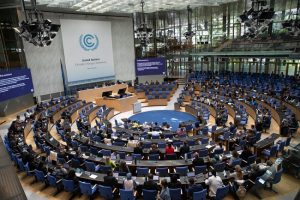As interest in carbon markets in Africa continue to rise, the sixtieth session of the subsidiary bodies (SB60) of the United Nations Framework Convention on Climate Change (UNFCCC) failed to reach agreement on all technicalities related to the implementation of Article 6 of the Paris Agreement, demonstrating the complex challenges of emissions trading. The methodological elements of the new UN carbon crediting mechanism also remained largely unresolved.

Article 6 governs how countries can cooperate voluntarily in the implementation of their nationally determined contributions to climate action while promoting sustainable development and environmental integrity.
The SB60 negotiations on Articles 6.2 and 6.4 of the Paris Agreement focused on the technicalities of international carbon trade, particularly authorisation and reporting on transaction, as well as the role of an international registry. The African Group of Negotiators on climate change (AGN) offered progressive solutions which can potentially break the impasse and link the voluntary trading schemes of Article 6.2 with authorisation processes deriving from Article 6.4, and thus addressing many of the uncertainties of voluntary carbon trading.
The AGN’s contributions to the SB60 negotiations on Article 6 were informed by key outcomes from a regional workshop on “Regulating carbon markets: building capacity for the Implementation of Article 6 of the Paris Agreement”, that was held from May 14 to 16, 2024, in Victoria Falls, Zimbabwe.
Organised by the African Climate Policy Centre of the ECA, in collaboration with the AGN and the Government of Zimbabwe, the workshop was motivated by the increasing interest in carbon markets in Africa against a background of lack of clarity on operationalisation of the rulebook for the implementation of Article 6 Paris Agreement and the need to provide technical backstopping to the AGN ahead of the SB60 meetings.
The workshop highlighted the essential role of carbon markets in incentivising emission reductions and fostering sustainable practices to align with the goals of the Paris Agreement. Emphasising the need for integrity and transparency in carbon market design, participants discussed the importance of promoting technologies and practices that drive emissions reductions, rather than solely relying on mobilising development or climate finance.
Key topics addressed during the event included the current asymmetry between supply and demand in African carbon markets, the urgent need for regulatory tools to manage these markets effectively, and the significance of focusing on cleaner technologies to achieve emissions reduction targets. Discussions also centred on the operationalisation of Article 6 of the Paris Agreement, the submission of Nationally Determined Contributions (NDCs), and the impact of internationally transferred mitigation outcomes (ITMOs) on climate commitments.
Prominent initiatives undertaken by countries such as Ghana, Mozambique, Senegal, Zambia, South Africa, Uganda and Zimbabwe were lauded for their efforts in implementing Article 6 of the Paris Agreement, showcasing a commitment to combating climate change through carbon pricing mechanisms, clean energy projects, and sustainable agriculture practices. The workshop served as a platform for experience sharing, peer learning, and capacity building to enhance the implementation strategies of African countries striving to meet their climate goals.
The gathering featured insights from distinguished speakers, including El Hadji Mbaye, Article 6.4 Mechanism Supervisory Board member, who shared Senegal’s experiences in implementing Article 6 provisions. Discussions led by Washington Zhakata of Zimbabwe shed light on Africa’s potential in carbon trading by overcoming market participation barriers and transitioning projects from the Clean Development Mechanism (CDM) to Article 6.4 mechanisms.
Participants were briefed on the creation of Article 6.4 carbon registries at national, regional, and international levels, with a focus on utilising platforms like Verra and Gold Standard for credit registration. The workshop also highlighted the UN Development Programme’s support for African countries in implementing a comprehensive carbon credits registration software and building capacities for effective participation in carbon markets.
With insights from the United Nations Framework Convention on Climate Change (UNFCCC) representatives, the event concluded on a note stressing the importance of sustaining dialogue, collaboration, and innovation to advance sustainable economic development and resilient climate action in Africa.
